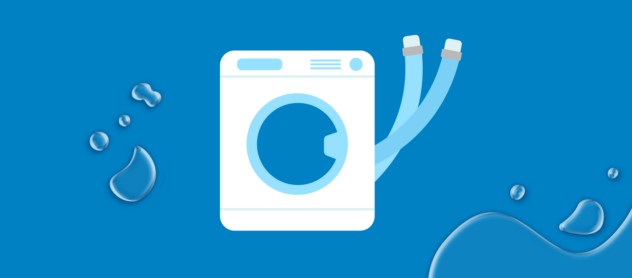As homeowners, we are focused on doing our best to protect our homes from obvious damage. But how often are we checking for signs of unforeseen water damage?
When many people consider water damage, they think about outside sources like heavy rainfall or flooding. However, property loss and damage due to water escaping from inside the home is extremely common.
One of the most common sources? The washing machine.
Knowing your washing machine hoses
Washing machines use a lot of pressurized water. This water is transferred into the machine through hoses located at the back of the appliance, which are connected to the valve that supplies water for each wash. Since they wear down over time and commonly burst when compromised, they put your home at risk for water damage.
It’s important to have quality washing machine hoses to minimize that risk.
Can you use any type of hoses for your washing machine?
Many washing machines come with rubber hoses. This isn’t necessarily an immediate concern, however rubber isn’t as durable as braided stainless steel.
We recommend upgrading to quality braided steel hoses. The braided stainless steel encases a rubber hose, creating a burst-resistant bond. Sometimes the braided steel can puncture the rubber hose if it becomes bent or kinked, so try to find hoses with an elbow at the end to prevent this. Don’t forget to contact a qualified contractor to ensure your hoses are installed properly.
How long do washing machine hoses last?
Since your washing machine is a well-used appliance, your hoses will experience wear and tear over time. Depending on the material of your hoses, they may wear out quicker.
In general, hoses should be replaced anywhere from three to seven years, depending on the manufacturer. You can determine when it’s time for a change by regularly maintaining your washing machine.
Why do washing machine hoses leak?
Before we get into washing machine hose maintenance and why it’s important, let’s talk about reasons why they leak.
- Wear and tear. No matter what type and quality of hoses you have in your home, they’re going to have natural wear and tear and will eventually need to be replaced so they don’t create water damage.
- Water quality. Certain types of water, like hard water, can corrode the washing machine hoses interiors causing sediment to build up, disrupting the water flow.
- Incorrect installation. Leaks can be caused by hoses that are not connected properly to the water valve or washing machine. Hoses can also leak if they’re twisted or bent during install.
How to properly maintain your washing machine
We recommend monthly maintenance checks on your washing machine. This helps to catch early signs of leakage and ensures your hoses remain in good condition.
- Inspect your hoses for signs of leaking or damage. You can do this by visually checking for bulges or cracks, feeling for any wet spots or looking for any watermarks on the ground.
- Know when your hoses were changed. All types of hoses need to be replaced eventually. If you are unsure of the age of your hoses, it may be best to replace them.
- Ensure your hoses (and inlets) are properly connected to the water source. If they aren’t properly connected, there’s a higher chance you’ll have to deal with a leak.
- Turn off the water supply when you aren’t using the washing machine. This will minimize the water pressure the hoses are exposed to over time, slowing down wear and tear.
- Leave the door open after washing. Keeping the door open for 15 to 30 minutes after washing helps remove the moisture and prevent mold and bacteria build-up in your washing machine.
- Clean the drain pump filter. If you start noticing problems with water drainage, excessive vibrations, or wet clothes after a final spin or longer cycle times, your drain pump filter may need a cleaning. Hair and fabric can get clogged and affect water drainage, so it’s important to be aware if you notice any of these things.
Keep your head above water
Understanding how your washing machine hoses work and how to maintain them are easy ways to prevent water damage in your home. If you are unsure if your washing machine’s hoses are working correctly, connect with an expert in your area.
Let’s be flooded with joy, not water.
